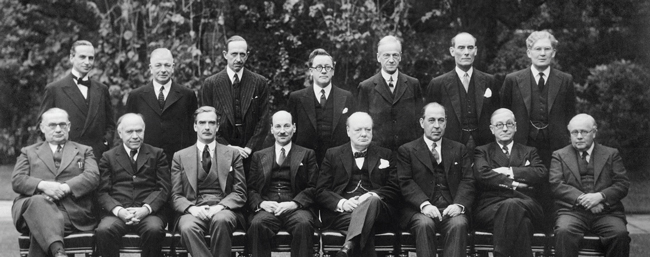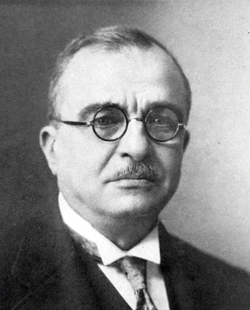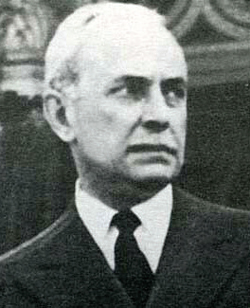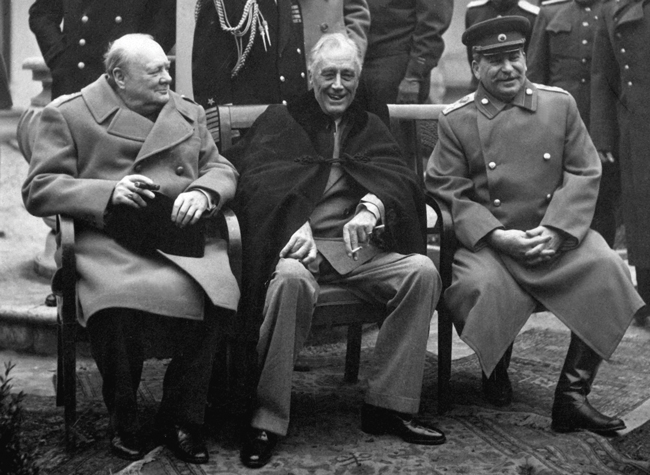WWII: THE DECISION ON GREECE (Part I)
Posted by estiator at 19 January, at 19 : 26 PM Print
January-February 1941
The Italians driven back from Greece – Herr Hitler’s Balkan plans – We advance in the Western Desert – Herr Hitler’s orders for Sicily and Bulgaria – General Metaxas dies – A bad flight to Cairo with Sir John Dill – My “sealed orders” – Gen. Wavell favours a Greek campaign – He appoints General Wilson to the command – Athens – A moving interview with the Greek Prime Minister – Anglo-Greek decision to hold the Aliakhmon line-Prince Paul of Yugoslavia hesitates.
From the book The Memoirs of Anthony Eden, Secretary of State for War
(Previously published in the Greek-American Review, February 2004)

The Churchill Coalition Government 11 May 1940 – 23 May 1945: The Churchill Coalition War Cabinet: standing, from left to right, Sir Archibald Sinclair, Mr A V Alexander, Lord Cranborne, Herbert Morrison, Lord Moyne, Captain Margesson and Brendan Bracken. Seated, from left to right, Ernest Bevin, Lord Beaverbrook, Anthony Eden, Clement Attlee, Winston Churchill, Sir John Anderson, Arthur Greenwood and Sir Kingsley Wood.
MUSSOLINI’S latest aggression against Greece was paying no dividends. The Italian onslaught collapsed almost at once and a vigorous Greek counter-offensive soon drove the enemy back over the frontier into Albania, four squadrons of the Royal Air Force playing their daring part in these engagements. On November 11th a brilliant thrust by our naval air arm had put half the Italian, battle fleet out of action at Taranto. These events and their consequences were soon to engage me at the Foreign Office as they had done at the War Office before.
Meanwhile, Hitler was maturing his own plans for the Balkans and Russia. As early as November 4th he reflected that he might have to come to the rescue of the Fascist excursion against Greece, which he described as a “regrettable blunder.” On November 12th he ordered the German Army Staff to prepare for an advance through Bulgaria in order to occupy the northern Greek mainland. Molotov was in Berlin from November 12th to 14th, and Hitler tried to use this opportunity to deflect Russian interest from his Balkan scheming. He proposed the signature of a new German-Soviet agreement, with protocols defining the Russian sphere of interest as “south of the national territory of the Soviet Union in the direction of the Indian Ocean,” while offering Russia freedom of passage for her warships through the Turkish Straits. [1]
This was tempting bait, but Molotov would only swallow it if he could get his other demands as well. Russia, he firmly indicated, was closely interested in the Balkans. The official Soviet reply was more explicit, Bulgaria must accept a Russian guarantee and a Russian base within readh of the Straits. In addition, the Soviets wanted German troops withdrawn from Finland, the Japanese to renounce their right to concessions in North Sakhalin, and the area “south of Batum and Baku in the general direction of the Persian Gulf” recognized as the centre of Soviet aspirations.[2]
For this disagreeable revival of the Russian appetite, as well as the danger which he foresaw of a British intervention in the Balkans, Hitler thought it convenient to blame Mussolini. He wrote to him:
The situation which has now arisen has very grave psychological and military repercussions which it is important understand clearly.
With Russia, too, it is more difficult to bring about an agreement on interests and to divert Russian ambitions towards the east.
M. Molotov showed, on the contrary, an increased interest in the Balkans.
England is now obtaining a number of air bases which bring her into close proxiity to the oilfields of Ploesti, and likewise also within striking distance of all southern Italy.[3]
The Fürer’s plans were soon recast. He called off preparation for an advance through Spain upon Gibraltar, being thwarted by General Franco’s refusal to fix a date for Spain’s entry into the war and having also new engagements elsewhere. On December 13th Hitler issued his orders for the attack on Greece through Bulgaria and, five days later, for the campaign which broke his power, the attack on Russia. There remained the problem of the Yogoslavs. If possible they must be coaxed; the carrot of Salonika was therefore dangled before them, but pressure was also applied to make them join the Tripartite Pact.
On New Year’s night I was in the Foreign Office after dinner, when the Prime Minister summoned me to discuss a telegram to President Roosevelt. Kingsley Wood and Beaverbrook were also there. When we had done our work and the others had gone, Churchill took me on to the roof. It was raining and the firing that evening was slight. I could not help wondering what fate would have in store for us before the next New Year’s day came around.
***
Throughout the war I had audiences of King George VI and these were always easier than they had been during my earlier spell as Foreign Secretary, when I had not known His Majesty so well. When I saw him in January, the King spoke of Halifax’s departure and I told him that, for Halifax’s own sake, it was wise; he had many critrcs and they were hunting him. The King nodded and agreed with a later remark of mine, that we ought to have had three-party government much sooner It was not made easy for him, King George said, to meet the Labour leaders. Eventually he had told Chamberlain that he must see Attlee and Greenwood from time to time or he would never get to know them.
January 4th: Good news of five thousand prisoners at Bardia. It looks like being a race whether we can cause complete defeat of Italians in Libya before Germans loose their attack on Greeks as l feel sure they mean to do.
The Greeks were now held up in Albania by bad weather and lack of transport and supplies. Inevitably their requests for help in war material multiplied and, in trying to meet them, we had to consider the prospect, which at that moment seemed imminent, of a German advance through Bulgaria.


To counter this, the Defense Committee decided on January 8th to approach the Greeks about the dispatch of British forces to Salonika. General loannis Metaxas, the Greek Prime Minister, refused, arguing that such a reinforcement would merely provoke a German attack without being strong enough to repel it. The Greek Government were ready to make plans, he sard, but did not want Bntish troops to arrive until they were in sufficient strength for attack as well as defense. This was much more than our resources could provide. The Yugoslav Government improved upon the Greek reluctance, telling Athens that if the British sent troops to Salonika, and so provoked a German attack, they might have to let the Germans advance through Yugoslavia.
The Defense Committee, therefore, decided on January 20th not to press the Greeks, but to allow Wavell to continue his advance as far as Benghazi and, at the same time, tell him to start building up a mobile reserve which could be used as occasion required, to go either to Greece or to Turkey, or for other operations in the Mediterranean.
January 20th: Dined with Winston and Clemmie [Mrs. Churchill] alone. W. in very good form and clearly encouraged by his most successful Clyde trip. He had been through all three I.L.P. [Independent Labour Party] seats and warmly welcomed everywhere.
He was pleased I was at Foreign Office and asked me to confess I was also. I did so. “For,” said W., “it is like moving up from fourth form to the sixth.”
We had long meeting of Defence Committee… W. was reluctant to give up a certain favourite project of his [the capture of Pantelleria]. I talked to him of this again after the meeting. He admits it cannot now be carried out, but is very irritated against Chiefs of Staff for not having done it sooner.
News of Italian withdrawal from Kassala came in during evening. Winston maintained at dinner that this was “Anthony’s strategy.” Which, of course, is nonsense, but l did have to struggle with him to prevent him forbidding Wavell to move 4th Indian Division south, as we had planned. Anyway if we can advance to Agordat [in Eritrea] this should be important contribution to finishing up Italian East African resistance.
***
A few days earlier, on January 11th Hitler had taken further decisions. Mussolini, he considered, could not be allowed to collapse under the weight of the defeats which British and Greeks were dealing him. The Fiihrer issued orders for German forces to go to the help of the Italian army, both in the desert and in Albania. An armoured formation, soon to become famous as the Afrika Korps, was not ready for Tripolitania, but Hitler did not tell Mussolini of this until April 5th. The other force was prepared for Albania, to Join up with the main German advance through Bulgaria, but it was later countermanded.
On January 11th, German air force units began to operate against the British from Sicily. Their power soon demonstrated that Benghazi could not be relied upon as a supply port for any advance upon Tripoli.
Meanwhile Hitler had to soothe the Russians, who did not like the stories reaching them of a German build-up in Bulgaria. The Soviet Ambassador in Berlin was told that the concentrations were only directed against the British and the Greeks and had nothing to do with the Straits. But in all these plans and proJects, Yugoslavia held the master geographical position and Hitler had not yet succeeded in winning over the Yugoslav Government. For their immediate reckoning, therefore, the German High Command had to accept that they would not be able to use the Yugoslav railways for the attack on Greece.
January 20th: A heavy day, during a great part of which I was afflicted by a most unpleasant headache. News of Metaxas’ death, a heavy blow. A small country like Greece cannot be expected to produce two such men in a generation, and the political field is sparse.
A long conversation with Maisky in the afternoon and later with [Sir Malcolm] Robertson about reform of office. De Gaulle followed him about N. African problems, Bobbety [Cranborne] about Abyssinian ones, and then a Cabinet. After which more work until a hurried dinner with Charles [Ponsonby, my Parliamentary Private Secretary] at Brooks’s. Then Chiefs of Staff Committee at 9:30 which continued until midnight and talk with Winston until one and work m my room until two.
We all feel that we are having our good days in Africa but that there is much rough weather ahead in Central Mediterranean and Balkans. Turkey is the key and we must intensify our efforts there. We discussed my going to Turkey. Portal very keen if it can be managed. Winston also anxious that I should see Wavell who he feels is insufficiently aware of Balkan dangers.
Events were soon to prove that this was not so.
General Metaxas had prepared his country for the war he believed inevitable, and led it with a remarkable discrimination and courage. With his death the Greek Government grew apprehensive about the country’s ability to withstand the Fascist weight in numbers, and still more so about Nazi intentions. On February 8th the new Greek Prime Minister, M. Koryzis, gave Sir Michael Palairet, the British Minister in Athens, a note suggesting that we should fix the size and composition of the forces which we were prepared to send to Greece. We could then see, he explained, whether they would be enough, with the Greek forces, to check a German attack and encourage the Turks and the Yugoslavs to come into the war.
Within the last few days Mr. Churchill had offered to send air forces to Turkey, but the Turkish President had refused, on the familiar ground that to admit British units before a German attack, would precipitate it. Even so, Turkey still loomed larger in my mind than Greece.
In contrast to the previous autumn, the desert battle had now been fought and won. If a secure flank could be established at Benghazi, forces would be released for use elsewhere. Moreover, German infiltration into Bulgaria posed a threat which had not existed in the autumn of 1940. We could attempt to meet this help to Greece or Turkey. We could not do both.
On the morning of February 10th I sent the Prime Minister a detailed minute with more question marks in it than was my habit. No doubt, I wrote, he would be reviewing the military position after the fall of Benghazi and deciding upon military strategy. My questions were those upon which we must clear our minds from the political angle. The capture of Tripoli would have political as well as military advantages, for example proximity with the French Weygand. If, on the other hand, circumstances compelled us halt the advance at Benghazi, what effect would this decision have upon our ability to send help to Greeks and Turks? How much could we send and when could it arrive? I judged the Greeks would say:
“We are willing to accept any British force you care to send, but you yourselves will wish to make sure that that force is adequate for its task.” Can we, in any circumstances, send such a force to Greece? If so, when will it and the necessary shipping be ready? If not, what material can we send for use by the Greek forces?
Having once again given first priority to our obligations to Turkey “as the buttress of our defense in the East,” I wrote of the political effect upon Turkey which would result from completing “the old programme of equipment which is heavily in arrears” and from preparing the ten air force squadrons recently offered for dispatch to Turkey. I concluded:
What worries me most about the Balkan situation is the position of Greece. Clearly if and when Germany has established herself in Bulgaria she will threaten Greece. Greek forces are inadequate to make any effective defense of the Macedonian front. Is it conceivable that we could send and maintain sufficient forces to fill this gap? I should fear not. Or can we hope that by reinforcing Turkey and preparing our aerodromes there we could develop a sufficient threat against the German flank to make the latter hesitate to engage himself heavily in Greece? Clearly the threat to the German flank is more effective if Turkey can maintain herself in Europe, or better still, advance into Bulgaria. Is it our present advice to Turkey that she should pursue either of these courses, or is it our view that the only sound strategy available to her is to withdraw to Asia and to use the Bosphorus, Sea of Marmora, and the Dardanelles as an antitank ditch?
The Defense Committee met that night and first considered the pros and cons of an advance upon Tripoli, deciding against this.
Then it discussed the situation in the Balkans and Turkey, and whether our forces should be offered to Greece or to Turkey. The Turkish Government had recently refused our offer of air support; Koryzis had said again that Greece would resist a German attack at all costs and had suggested that the size and composition of what British forces could be sent to Greece should now be determined. We also had to take into account the guarantee which had been given to Greece by Mr. Chamberlain’s Government on April 13th, 1939. If another country to which we had given such a pledge were to fall to the Axis powers without a real British effort to prevent it, the effect, especially in the United States, must be deplorable.
The Committee decided to concentrate on building up a force to help Greece. Such a decision would probably limit to Eritrea for the time being our coming East African offensive, but this was accepted. There was no division of opinion about the conclusion.
Meanwhile much detailed work was necessary. Military and political action would have to be closely coordinated on the spot. The Defence Committee decided that the C.I.G.S. and I should go at once to Cairo to put this decision into effect.
***
Mr. Pierson Dixon, of the Southern Department of the Foreign Office, and my Principal Private Secretary, Mr. Ralph Stevenson, travelled with me, while Brigadier Mallaby accompanied Dill.
February 12th: A strenuous final morning. Answered questions in the House, and attended luncheon given for me by Maisky. Had difficulty in getting away from this and shedding Dalton in time to catch special at 3.40. Hardly a secret departure, the train being drawn up at No.1 platform, a space railed off and a crowd assembled.
Uneventful journey [to Plymouth] during which I got through some papers and slept. A lovely evening, but learnt to our disappointment that the weather was bad at Gib and we could not start.
February 13th: A day of waiting with what patience we could muster. A sunny morning and afternoon when we crossed to Mt. Edgrumbe and walked in the park, discussing policy. In the evening the wind got up and there was no hope of leaving though we hung on from hour to hour. A disturbed night. Amongst other incidents Winston rang up at 1.30 a.m. to say that we were not to start until following evening. I had to collect station commander and with his help induce Winston to let us act as we thought fit.
February 14th: Luncheon with Admiral, when at length news reached us that the weather was improving and we should get off tonight. A destroyer is on its way from Derry, but we all pray not to have to use it in these mountainous seas. Dill and I filled in the time by going to “The Two Dictators,” which disappointed us. After dinner, and clearing up final papers which had come from London, we boarded our Sunderland. An Australian boy [Flight Lieut. Havyatt] in command, who had been second in command on my last return trip, and a grand crew. Took off in pretty difficult conditions at 11.30 p.m. A terrific part flight. Met. people proved all wrong, and whereas first part of flight was difficult, second, expected better was infinitely worse. At one time storm was so violent that we could make scarcely any headway, instruments ceased to function properly and we were hopelessly astray. I managed to sleep pretty well despite all this and had no idea how bad things were, until I was roused about y a.m. with cheerful tidings that pilot feared he had not enough petrol to reach Gib. He could, however, put in to Cadiz, where we should be interned, should he do so.
Went up and had a talk to pilot and navigator, as far as one could have a talk in these conditions. Gathered that there was a chance that we might reach Gib. and decided we should take it. Dill had been very ill during this period but he agreed with decision, and later went up himself, talked to pilot again and confirmed it. A little later, I went up again and found that we had done a little better in last half-hour, having made forty miles at the cost of fifty gallons. Seventy-five miles remained to do, on one hundred gallons, so we should just do it. Suggested to pilot that he should send message to Gib. telling of our troubles and asking them to send destroyer out to pick us up if we were compelled to force land in Straits. We had earlier agreed that if Straits were too rough and petrol at that stage was clearly not enough, we should put in at Tangier and try with Gascoigne’s [British Consul-General at Tangier] help to bluff our way out. There were many other adventures. We drained two tanks dry and had to switch to reserve tanks, engines conking out in interval and we losing height rapidly. But engines picked up again all right.
We eventually landed with forty gallons to spare, about ten minutes’ flying at the pace of our consumption during part of our flight. We should not have made it, if our pilot had not been really splendid, and the navigator and every member of the crew. They were most of them very sick, but kept going somehow. On one occasion pilot had to cut a corner and fly over Portuguese territory to save vital mileage and petrol. Sunderland that preceded us was piloted by very experienced Wing Commander [Francis Fressanges] who said that in twenty years’ flying he had never met flying conditions to compare with these and that no machine but a Sunderland could have stood up to them. The Sunderland that followed us is lost.
Physically the discomfort was much less than in my Prague-Cologne flight, but it was a queer sensation sitting trussed in one’s lifebelt and contemplating the alternatives of internment or drowning. One felt strangely detached and could review it all dispassionately and conclude that one had had a very good full life. But the crew were all such boys.
Flight Lieutenant Havyatt, Royal Australian Air Force ‘ waslater killed in action.
February 15th: A bath and shave and drink and we were ready for a late luncheon at 2.30. Sam and Maud H. [Hoare] here, otherwise Govt. House party only. Slept in H. afternoon until near dinner. Weather too bad to go on tonight.
February 16th: A meeting in morning when we discussed plans for help to Spain should need arise. Gave lines for draft to P.M. which we later discussed, amended and approved. Lunched with Admiral. Weather still bad and no chance to leave tonight.
I had “sealed orders” which the Prime Minister had entrusted to me with solemnity and relish when I left with the injunction that I must not open them while I was still in the country. I broke the seals at Gibraltar, which was not so dramatic as it sounds because I had discussed the contents at length with Mr. Churchill during the previous days. My instructions provided that my principal object must be to send speedy help to Greece. To this end I was to initiate any Action which I might think necessary with the Commander-in-Chief, Middle East, and with the Greek, Turkish and Yugoslav Governments. I was to consider what was the minimum garrison required to hold the western frontier of Libya and Benghazi, and what measures should be taken to make Benghazi a main naval and air base.
When in Athens I was to make the best possible arrangements I could with the Greeks. I was to try to keep the War Cabinet informed, or ask their help as far as possible but in an emergency I must act as I thought best. I was to deal direct with the Yugoslav and Turkish Governments with the object of making both countries fight at the same time or do the best they could. While our first duty was to fight, and if necessary to suffer, with Greece, the interests of Turkey at the second stage were no less important to us than those of Greece. I was to gather together all the threads and propose continuously the best solutions for our difficulties and not be deterred from acting on my own authority if the urgency was too great to allow reference home.
February 17th: Sam and Maud [Hoare] left. We still unable to get off. Read War and Peace, walked about the rock, and gazed at the storm through the window. Telegraphed to Malta to ask them to send Glenn Martins to fetch us. Said they had only one and that was needed for an operation by C.-in-C. Mediterranean. Then telegraphed please send a Wellington bomber. Answer, Wellington could not take off with necessary load of petrol.
During this enforced delay, Dill and I had some talk about our orders and how to fulfil them. While Dill did not believe in a campaign for Tripoli, he was concerned for Turkey, which he rated strategically above Greece. We were both of us troubled at the slow progress of our journey. Time was so important and we did not know what Wavell’s own sentiments might be about the political and military decisions we must now take. If he had different views from ours and those of the Defence Committee, our delay in reaching Cairo and exchanging opinions with him could be dangerous.
As Yugoslav policies must so closely influence any decisions we might take I had sent on February 15th a message to Prince Paul, Regent of Yugoslavia, suggesting I should meet him in southern Serbia. The Regent refused, fearing that a meeting would be too dangerous; later attempts to get him to change his mind also failed. I regretted this, for, as old friends, we could have talked frankly together and I could have told him of our plans in more detail than was possible in the letters I wrote to him. But whether I could have given him more resolution is another matter, for on the day before my message was sent, the Yugoslav Prime Minister and Foreign Minister had meetings with Hitler and Ribbentrop at the Fiihrer’s house in the Obersalzberg.
Though already enmeshed, the Yugoslavs were still wriggling to avoid committing their country to the Axis, and proposed mediation to stop the Italo-Greek war. If this could be contrived, they said, the British would leave Greece and the Balkan States could join together in a neutral bloc. The Nazis were contemptuous of this attempt to reverse events, as well they might be, with their grip tight on Roumania, their entry into Bulgaria due to begin in another fortnight and their plans for attacking Russia already laid.
February 18th, Gibraltar: After another depressing morning, a sudden improvement in the weather about lunch time. Hopes rose as the afternoon wore on and I came back from a walk to learn that we were to take off at 6 p.m. We did so, in a pretty choppy sea. Earlier part of flight fair, but it soon became rough and we were flung about without respite until we reached Malta about 3 a.m. A difficult landing and then found ourselves left tied up to a buoy in a rough sea. I have never felt a more uncomfortable sensation. Neither Dill nor I having had one wink of sleep we became mildly irritated that nobody came to take us.
Learnt later that one of the causes was that old Dobbie had put off himself on the launch, had felt ill on the way and launch had then been ordered to take him back again. After vehement wireless messages, we were at last rescued and reached Palazzo Bobbie three and a half hours after landing at Malta. We learnt on reaching shore that there was another Sunderland available to take us on and decided to leave the same morning.

Conference of the Big Three at Yalta makes final plans for the defeat of Germany. Here the “Big Three” sit on the patio together, Prime Minister Winston S. Churchill, President Franklin D. Roosevelt, and Premier Josef Stalin. February 1945.
February 19th: Two hours sleep, wash, bath and breakfast and off to join our Sunderland. On the way Dill and I spoke to a gathering of officers of the garrison. A difficult take-off, for it was still blowing hard, but a smooth flight to Suda Bay in Crete. I should have explained that during breakfast Air O.C. arrived and said that reports from Egypt as to weather were so bad, sand storms etc., that we could not land there, but urged us to go on to Crete and spend night on board a warship there. I found it difficult to believe Egyptian weather could be so bad as to stop us landing, but accepted his advice, refusing a suggestion that we should stay in Malta. I stipulated though that a message should be sent to Suda telling us latest weather forecast.
At Suda found York and Jack’s [Egerton] ship Bonaventure. Went on board with C.I.G.S. and Jack showed us over his ship. Portal’s brother commands York. Seemed to me a very good man. We were to have dined and slept with him and all arrangements had been made, but we felt that we must press on. Reached Cairo about 11 p.m. which is pretty good time, twenty-nine hours from Gibraltar.
The Ambassador and Wavell met us, and Dill and I had a few words with the Commander-in-Chief at the landing stage before going on to the Embassy. Wavell looked at us with the contemplative expression that he sometimes wore and remarked: “You have been a long time coming.” We felt this reproach rather unjust and murmured our explanation. He nodded and then came the comment: “As you were so long I felt I had to get started, and I have begun the concentration for a move of troops to Greece.” Dill and I exchanged a glance, relieved that Wavell’s mind was apparently in tune with our instructions. Two months later, when I was back in London, I received unexpected confirmation of this. Dill showed me a memorandum which Wavell had written that day, before our arrival in Cairo, strongly in favour of going to the help of Greece. After supper I had some talk with the Ambassador, read the telegrams from home, and finally had a discussion with Colonel William Donovan. He had been touring the Balkans for the United States Government and was able to give me a first-hand account of recent developments. His blunt speech in those countries had been useful and I was grateful to him for waiting several days to see me. I asked him to send the President a message emphasizing that any action we might take in the Mediterranean would overstrain our shipping resources and inviting him to help if he could.[1]
FOOTNOTES
- Documents on German Foreign Policy; Series D, Vol. XI, Nos. 325-6, 328-q
- op. cit., No. 404.
- op. cit., No. 36g, Hitler’s letter to Mussolini, Nov. 20th, 1940.
- Foreign Relations of the United States, 1941; Vol. II.
We hope you found this article for WWII interesting. Please consider subscribing to Estiator magazine for more articles like this one. Estiator magazine is a monthly Greek-American magazine featuring articles from Greek and U.S. history, as well as news from Greece and the US. Thank you for reading, and while you're here please visit our other sections with current news from Greece and the US, Greek culture, Greek cuisine, restaurant news and restaurant sales.


















